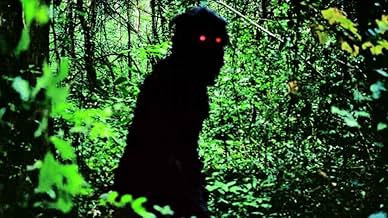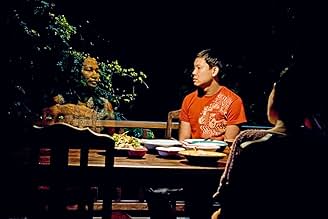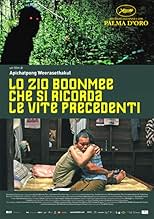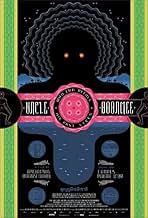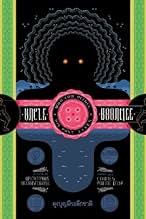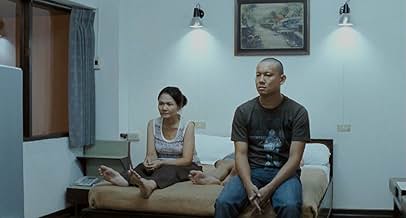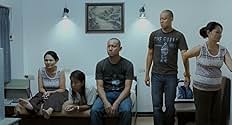Oncle Boonmee (celui qui se souvient de ses vies antérieures)
Titre original : Loong Boonmee raleuk chat
- 2010
- Tous publics
- 1h 54min
NOTE IMDb
6,7/10
18 k
MA NOTE
Dans une ferme au nord de la Thaïlande, un homme qui se meurt d'une maladie rénale passe ses derniers jours sombres auprès de sa famille, y compris le fantôme de sa femme et un esprit de la ... Tout lireDans une ferme au nord de la Thaïlande, un homme qui se meurt d'une maladie rénale passe ses derniers jours sombres auprès de sa famille, y compris le fantôme de sa femme et un esprit de la forêt, autrefois son fils.Dans une ferme au nord de la Thaïlande, un homme qui se meurt d'une maladie rénale passe ses derniers jours sombres auprès de sa famille, y compris le fantôme de sa femme et un esprit de la forêt, autrefois son fils.
- Récompenses
- 11 victoires et 25 nominations au total
Kanokporn Tongaram
- Roong
- (as Kanokporn Thongaram)
- …
Histoire
Le saviez-vous
- AnecdotesShot on 16mm film rather than digital. Director Apichatpong Weerasethakul wanted to film in this format as the film is all about dying traditions.
- GaffesThe first time a ghost appears, during dinner, the nephew passes the ghost a glass of water. You can see the ghost image superimposed over the nephew's arm when he places the glass of water on the table.
- ConnexionsFeatured in At the Movies: Cannes Film Festival 2010 (2010)
Commentaire à la une
This was a hard film to rate. It pains me not to have fallen in love with it. Here, then, are some scattered thoughts of my failed romance.
It started with a very sour first date. It also ended there.
I went in looking to see a film that won the Golden Palm at Cannes 2010. Knowing this fact, and having seen the trailer, I went to the theater expecting to see an art house piece with Oriental metaphysical overtones. What I saw was, to be sure, a decisively original and at times hauntingly beautiful film, but one that I found an absolute bore: a film that, to me, seemed a tiresome, dysfunctional, inchoate potpourri of disjunct elements that never quite flowed together.
Perhaps false expectations can ruin a movie. Or, perhaps, let me hazard the unlikely suggestion, there is nothing here to salvage? For let me be clear: I wanted to like this film, I really did. It is important to reward originality and craftsmanship, always. And I respect the film (or at least its intentions). But the fact remains (here comes the unavoidable, brutal, decisive fact), I didn't like it. I only liked a few scenes here and there. Some parts I hated, absolutely loathed. Despite a few glimmerings of genius - and an undoubted air of originality - it seems to be that Uncle Boonmee is a needlessly difficult, slow-paced and ultimately unsuccessful film... despite the fact that it gets to a great start and carries a lot of potential all the time. Perhaps the "elusive" quality mentioned by the high-praise reviewers is a mask behind which there is no greater coherence to be found. Perhaps the inchoate structure and the belaboured pacing are not marks of genius but amateurish vices committed in the name of some grand vision that shall forever remain out of our material reach. I fault this film not because of its weird themes or its occasional dream logic. On the contrary, I think that it may even be that the film wasn't weird enough or dreamy enough; perhaps this film's use of "magic realism" is a kind of materialistic trap that forces the movie into long, never-ending sequences of absolutely no consequence. The main vice of the film is its unadventurous reliance on fixed camera frames and boring, dragging shots. Editing between the scenes is tortuously snail-paced and almost morphine-mimicking in its soporific entailments.
Whatever the reason, the film feels too much jumbled together, like some heavy stone stuck in a spiritual limbo, or a unicorn eating a burger, or some such nonsense. Ironically, the main stumbling block for the film, if you ask me, is not its "artsiness", but its clumsy down-to-Earthness. The film seems to be grasping for some supreme realism and materialism underneath its spiritual, religious and metaphysical surface. But the result is a kind of Ken Loach of Buddhism: a boring materialism under the guise of animistic spiritualism. Just plain realism without a purpose: people doing boring stuff for boring reasons.
Or perhaps all this is wrong; perhaps all this analysis is useless. Perhaps we are back to false expectations again: I expected one thing and saw another. But who cares WHY I didn't like it? Surely all this is uninteresting? Well, perhaps, but let me say that my personal dilemma - how I wanted to love this film so much but ended up almost hating it - is an interesting story to tell, because this film has the potential to divide audiences totally, into "haters" and "praisers" - and very few lukewarm receivers in between. I definitely recommend this film to be seen, but I am not going to play the art house card, the usual cop-out: "I'm sure it's a masterpiece, I just didn't get it", and then give it a score of 8 or 9 despite having hated it myself, out of some duty-bound, deranged, depersonalized sense of professional duty or peer pressure to agree with everybody else, or - worse yet - pretend to love the film because of some unhealthy respect for the jury at Cannes or the snidely snobbish world film press. No, this would be a scandalous road to take. One must stand by one's convictions, and it is my personal conviction, based on one viewing, that here we have an ultimately pretty bad film: a failed exercise at grafting something sublime. Despite its undoubtedly pure and original intentions and beginnings, this film remains an overrated (soon to be over-venerated), perplexing, highly original turd - interesting but ultimately vacuous, like some of Buñuel's lesser works, or like Andy Warhol's art.
Whether I change my opinion after a second, or third, viewing remains to be seen. So, despite my dislike of the film's overall structure, I feel that this is an important film, and I can easily recommend it to all movie lovers. Everyone remotely interested in film should go and see, form their OWN opinion, of such a remarkable cinematic piece: a film that, despite its flaws and vices, is undoubtedly a creation of unique character and visionary qualities. Weerasethakul's directorial voice is loud and persistent, and its echo will surely be heard for many years to come across the lands - and cinema screens - the world over.
Now, let him only refine his voice a bit and convince us skeptics.
Whether my love for this film will grow, who knows. I'm preparing for the inevitable "second date" - the future second attempt at falling in love - with a strange expectation of more melancholy moods.
It started with a very sour first date. It also ended there.
I went in looking to see a film that won the Golden Palm at Cannes 2010. Knowing this fact, and having seen the trailer, I went to the theater expecting to see an art house piece with Oriental metaphysical overtones. What I saw was, to be sure, a decisively original and at times hauntingly beautiful film, but one that I found an absolute bore: a film that, to me, seemed a tiresome, dysfunctional, inchoate potpourri of disjunct elements that never quite flowed together.
Perhaps false expectations can ruin a movie. Or, perhaps, let me hazard the unlikely suggestion, there is nothing here to salvage? For let me be clear: I wanted to like this film, I really did. It is important to reward originality and craftsmanship, always. And I respect the film (or at least its intentions). But the fact remains (here comes the unavoidable, brutal, decisive fact), I didn't like it. I only liked a few scenes here and there. Some parts I hated, absolutely loathed. Despite a few glimmerings of genius - and an undoubted air of originality - it seems to be that Uncle Boonmee is a needlessly difficult, slow-paced and ultimately unsuccessful film... despite the fact that it gets to a great start and carries a lot of potential all the time. Perhaps the "elusive" quality mentioned by the high-praise reviewers is a mask behind which there is no greater coherence to be found. Perhaps the inchoate structure and the belaboured pacing are not marks of genius but amateurish vices committed in the name of some grand vision that shall forever remain out of our material reach. I fault this film not because of its weird themes or its occasional dream logic. On the contrary, I think that it may even be that the film wasn't weird enough or dreamy enough; perhaps this film's use of "magic realism" is a kind of materialistic trap that forces the movie into long, never-ending sequences of absolutely no consequence. The main vice of the film is its unadventurous reliance on fixed camera frames and boring, dragging shots. Editing between the scenes is tortuously snail-paced and almost morphine-mimicking in its soporific entailments.
Whatever the reason, the film feels too much jumbled together, like some heavy stone stuck in a spiritual limbo, or a unicorn eating a burger, or some such nonsense. Ironically, the main stumbling block for the film, if you ask me, is not its "artsiness", but its clumsy down-to-Earthness. The film seems to be grasping for some supreme realism and materialism underneath its spiritual, religious and metaphysical surface. But the result is a kind of Ken Loach of Buddhism: a boring materialism under the guise of animistic spiritualism. Just plain realism without a purpose: people doing boring stuff for boring reasons.
Or perhaps all this is wrong; perhaps all this analysis is useless. Perhaps we are back to false expectations again: I expected one thing and saw another. But who cares WHY I didn't like it? Surely all this is uninteresting? Well, perhaps, but let me say that my personal dilemma - how I wanted to love this film so much but ended up almost hating it - is an interesting story to tell, because this film has the potential to divide audiences totally, into "haters" and "praisers" - and very few lukewarm receivers in between. I definitely recommend this film to be seen, but I am not going to play the art house card, the usual cop-out: "I'm sure it's a masterpiece, I just didn't get it", and then give it a score of 8 or 9 despite having hated it myself, out of some duty-bound, deranged, depersonalized sense of professional duty or peer pressure to agree with everybody else, or - worse yet - pretend to love the film because of some unhealthy respect for the jury at Cannes or the snidely snobbish world film press. No, this would be a scandalous road to take. One must stand by one's convictions, and it is my personal conviction, based on one viewing, that here we have an ultimately pretty bad film: a failed exercise at grafting something sublime. Despite its undoubtedly pure and original intentions and beginnings, this film remains an overrated (soon to be over-venerated), perplexing, highly original turd - interesting but ultimately vacuous, like some of Buñuel's lesser works, or like Andy Warhol's art.
Whether I change my opinion after a second, or third, viewing remains to be seen. So, despite my dislike of the film's overall structure, I feel that this is an important film, and I can easily recommend it to all movie lovers. Everyone remotely interested in film should go and see, form their OWN opinion, of such a remarkable cinematic piece: a film that, despite its flaws and vices, is undoubtedly a creation of unique character and visionary qualities. Weerasethakul's directorial voice is loud and persistent, and its echo will surely be heard for many years to come across the lands - and cinema screens - the world over.
Now, let him only refine his voice a bit and convince us skeptics.
Whether my love for this film will grow, who knows. I'm preparing for the inevitable "second date" - the future second attempt at falling in love - with a strange expectation of more melancholy moods.
Meilleurs choix
Connectez-vous pour évaluer et suivre la liste de favoris afin de recevoir des recommandations personnalisées
- How long is Uncle Boonmee Who Can Recall His Past Lives?Alimenté par Alexa
Détails
- Date de sortie
- Pays d’origine
- Sites officiels
- Langues
- Aussi connu sous le nom de
- Uncle Boonmee Who Can Recall His Past Lives
- Lieux de tournage
- Sociétés de production
- Voir plus de crédits d'entreprise sur IMDbPro
Box-office
- Montant brut aux États-Unis et au Canada
- 184 292 $US
- Week-end de sortie aux États-Unis et au Canada
- 23 540 $US
- 6 mars 2011
- Montant brut mondial
- 1 214 424 $US
- Durée1 heure 54 minutes
- Couleur
- Mixage
- Rapport de forme
- 1.85 : 1
Contribuer à cette page
Suggérer une modification ou ajouter du contenu manquant

Lacune principale
What is the Hindi language plot outline for Oncle Boonmee (celui qui se souvient de ses vies antérieures) (2010)?
Répondre

